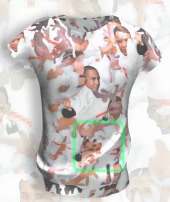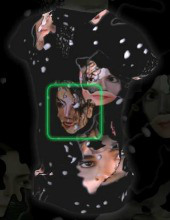Creepy T-shirts designed to baffle Facebook facial-reconition software
 Facebook loves your face.
Facebook loves your face.
It loves your face so much, it bought the Israeli start-up face.com for its facial-recognition technology in 2012.
It loves your face so so much, it uses this facial recognition – based off photos you’re already tagged in and soon your profile picture – to make it easier for your friends to tag you in photos.
Yes, Facebook definitely has, as Wired’s Kyle VanHemert put it, a mission “to secure its status as the world authority in who knows who – a constant, lumbering quest to improve its advertiser-serving ‘social graph’.”
How do you fight back? VanHemert suggested raising a stink with Facebook over the proposed policy changes, changing your profile picture to that of your dog, or – this option just in – buying a T-shirt printed with creepily distorted faces of celebrity impersonators, designed to give Facebook’s facial recognition technology a migraine.
 The garments – dubbed the “REALFACE Glamoflage” T-shirts – were designed by Simone C. Niquille as part of her* master’s thesis in graphic design at the Sandberg Institute in Amsterdam.
The garments – dubbed the “REALFACE Glamoflage” T-shirts – were designed by Simone C. Niquille as part of her* master’s thesis in graphic design at the Sandberg Institute in Amsterdam.
The shirts are custom-printed and sell for around $65.
The prints feature distorted faces of celebrity impersonators – Barack Obama, Michael Jackson and others – with the aim of creating an easy way to befuddle Facebook’s pattern recognition algorithms, Niquille told Wired:
I was interested in the T-shirt as a mundane commodity… I was interested in creating a tool for privacy protection that wouldn’t require much time to think in the morning, an accessory that would seamlessly fit in your existing everyday. No adaption period needed.
The project was inspired in part by the “ugly T-shirt” envisioned by William Gibson, VanHemert writes.
Gibson’s imagined T-shirt hides the wearer from CCTV surveillance, which in turn is similar to a type of camouflage used by ships in World War I – dazzle camouflage – in which the ships were covered in conflicting geometric patterns meant to scramble their speed, range, size and heading.
The shirts’ strategy is the same, Niquille told Wired: they won’t hide you, but they will mess up whomever’s watching you:
They won’t keep your face from being recognized, but they will offer distraction.
 How well they work also depends on how tightly they’re worn, she says: the tighter the fit, the better facial recognition will be able to recognize the faces in the fabric when analyzing photos of the wearer.
How well they work also depends on how tightly they’re worn, she says: the tighter the fit, the better facial recognition will be able to recognize the faces in the fabric when analyzing photos of the wearer.
Niquille’s thesis, titled FaceValue, is about what the designer calls “the (human) face’s value in a time of rapidly mutating standards and techno norms” – presumably, that includes biometrics, privacy and pattern recognition.
I say “presumably” because her writing tends to the prosaic rather than strictly expository.
An example:
FaceValue is what you and I will have left after CCTV gets hooked to the Facebook databank and parents look younger than their children. FaceValue is what will make a Britney lookalike earn more than Spears herself. FaceValue is what will remain after contemplating the appropriate nose for the day. FaceValue is what you’ll consider while putting in a new chimplant order at RapidAesthet3d the morning after. FaceValue is what stares back at you and me, relentlessly reflected in the surrounding screens as they fade to black.
In fact, the shirts are only one part of her thesis, which also encompasses two other projects: FaceBay, an online marketplace to buy and sell visages, and FaceValue: Accessories, which examines ways in which technology could enhance or augment a user’s physical face – from contact lenses that emitted an image-obfuscating reflection triggered by a camera’s flash to the Chin+, a 3D-printed prosthetic that offered a more prominent jaw, optimized for FaceTime or Skype video calls, as Wired describes it.
Is this a good way to fend off facial recognition?
Will you be ordering a T-shirt? Let us know in the comments section below.
Oh, and if you’re on Facebook and want to hang out with people who use their faces to eyeball Facebook’s every last move, join Naked Security’s Facebook page.
*Wired’s article uses both male and female genders to refer to the artist, and as of the time this article posted, I hadn’t been able to determine which is correct, so I went with “she”.
T-shirt images courtesy of Real Face.
Article source: http://feedproxy.google.com/~r/nakedsecurity/~3/Gt3SdJX7ruY/